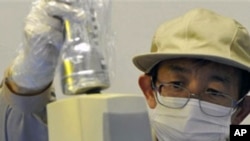The World Health Organization says no new public health measures are needed to counter the higher levels of radiation being emitted from Japan’s Fukushima Daiichi nuclear power plant. On Tuesday, Japanese authorities raised their rating of the severity of the accident at the nuclear plant to seven.
WHO says the severity of the releases of radioactive material at the Fukushima Daiichi nuclear power plant is a cause for concern. But, in terms of public health, it says the countermeasures taken soon after the accident in mid-March, are still good.
WHO Director of Public Health and the Environment, Maria Neira, says there is no need for new public health countermeasures.
"Those that are in place, things related to the evacuation zone, the relocation of certain populations, the measures associated with the early intake of potassium iodine pills for the population that has been identified by the Japanese government as appropriate, the issues related to food safety and controls-things like that…Those public health recommendations are still valid," she said.
The level seven rating given to the Japanese nuclear power plant is the worst on an international scale from five. It is equal to that given in 1986 to Chernobyl, long considered the worst nuclear accident in history.
But, Neira notes the two situations and their consequent impacts on public health are very different. For one, she says a massive explosion triggered the Chernobyl nuclear accident.
On the other hand, heavy emissions of radiation from the Japanese nuclear facility resulted from the plant’s cooling system, which was put out commission by the earthquake and tsunami.
Another important difference, she says, is that Chernobyl did not put in place similar life-saving countermeasures that are in operation in Japan.
Nevertheless, Neira says the severity of the Fukushima accident must not be under-estimated. She says the situation continues to evolve and nuclear watchdogs need to constantly assess and reassess the public health consequences.
"This situation unfortunately is not yet under control. We do not know what might happen. So, therefore, obviously, we continue to be very vigilant. We continue to be on alert,” Neira said. “We never came down on our level of alert at WHO and we continue to monitor on a very careful way how the situation is moving and our assessment might change completely in one hour. I do not know. But, for the time being, with the current data and the current situation, this is our assessment."
On a related issue, Neira, says WHO does not see any need to impose a ban on the export and consumption of food from Japan. She says no food is being grown in the contaminated areas. And, she notes, Japanese authorities test food before it is exported to make sure it is safe.
She does not discount the possibility that radiation might be present in some of the food products. But, she says the radiation is so minimal a person would have to consume large quantities of the food for a very long time for it to have a negative effect.




